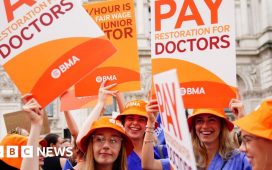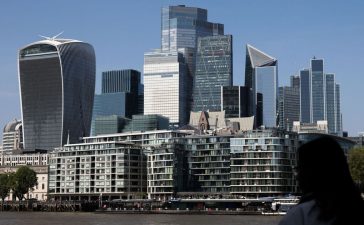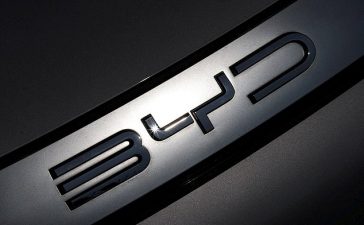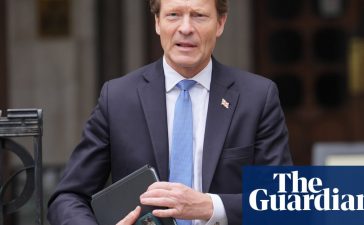Minister struggles to defend Keir Starmer over his record of accepting freebies
Good morning. The Conservative party may not have provided a great government for Britain, but it was the source of a never-ending supply of scandals, which gave journalists something to write about and provided some confirmation-bias entertainment to people who like that sort of thing. Labour was elected promising a much more ethical approach to government and on the scandal front, so far there has been little to report. At the weekend the Sunday Times gave us “frockgate” (not their term) – the revelation that gifts of clothing to Keir Starmer’s wife had not originally been disclosed in the register of members’ interest. But Starmer said that this was an oversight, that came to light precisely because his staff were double-checking what the rules said, and it has emerged overnight that the Conservative party’s attempt to get the parliamentary commissioner for standards to investigate has failed, because he has said no.
So is this all over? Not quite, while Starmer has been broadly successful in refuting claims that he tried to evade parliament’s disclosure rules, he probably has not won over the jury in the court of public opinion on the question of whether he should have accepted so many freebies in the first place.
In one sense, there is nothing new about this. During the election Financial Times (not normally seen as a Labour-bashing, scandal sheet) ran a report saying that Starmer had “accepted £76,000 worth of entertainment, clothes and similar freebies from UK donors since the 2019 general election”. No one paid much attention. Starmer later said that, because he was a football fan but security reasons meant it was not practical for him to go in the stands, he ended up accepting a lot of tickets for hospitality in the directors’ box. But he did not really explain why he had accepted so many other tickets, and clothes.
Many MPs accept freebies, when you are leader of the opposition many organisations want to invite you to events, and there is nothing that Starmer that has done that is against the rules, or unprecedented for a politician at his rank. But if anyone thinks that makes this a non-story, they should have a word with Angela Eagle, the border security minister, who struggled this morning when asked to explain why Starmer could not just pay for his clothes and tickets himself, like the rest of us.
She was on Times Radio first. Here is an extract from the transcript of her interview with Stig Abell.
Abell: “But let’s boil it down. Why shouldn’t the prime minister, he earns £166,000 a year, why shouldn’t he buy his own glasses?”
Eagle: “Well, why don’t you ask him?”
Abell: “Well, he’s not here. You’re here for the government. I mean, if he comes on here, we might try.”
Eagle: “I am, but I’m afraid I’m not responsible for decisions the prime minister makes.”
Abell: “You’re not, but you have an opinion. Should he not buy his own glasses? You’re wearing a pair of glasses now. You presumably paid for them yourself. I’m wearing a pair of glasses now. I pay for them myself. Why shouldn’t the prime minister?”
Eagle: “Well, the prime minister has had his say on that. And if you next time you interview him, you could ask him yourself. I don’t have an opinion.”
Abell: “Well, I’ll tell you why you might have an opinion. Angela Rayner had an opinion when Boris Johnson was getting money from donors. She tweeted: ‘What right does a man who complains he can’t live on £150,000 a year and ask Tory donors to fund his luxury wallpaper habit, what right does he have to lecture someone trying to survive on £80 a week?’ That’s what Labour attacked Boris Johnson for doing. And now you’ve got someone who has a luxury glasses habit who’s taking money from pensioners. People are going to have an opinion on that, aren’t they?”
Eagle: “OK you’ve had your rant.”
A few minutes later Eagle had to go through this all again with Kay Burley on Sky News. Here is an extract from that exchange.
Burley: “The Daily Mail today is suggesting Sir Keir has accepted at least £76,000 of freebies, including the royal box of Wimbledon hospitality at a Coldplay concert, Arsenal away games with the foreign secretary in tow. The list goes on. How does that align with the son of a toolmaker, man of a people image?”
Eagle: “Well, I think he’s an Arsenal fan. I mean, it takes all sorts, I suppose. [Eagle is from Liverpool.] But we only know about this because these things have been registered as appropriate. I think the prime minister had his say on that yesterday when he was in Italy. [He did, but he did not answer the question.] I’m here in Berlin.”
Burley: “He’s taken £76,000 worth of freebies. He’s going to great lengths to point out to us that he’s a man of the people, and he’s taken £300 off pensioners and taking £76,000 worth of freebies.”
Eagle: “I think it’s important also to remember that, with respect to pensioners, the triple lock is being maintained for the whole parliament, and that means that pensions are going to rise by 2.5%, by earnings or inflation, whichever is the greater … [The Tory economic legacy] means some difficult decisions that none of us wanted to make.”
Burley: “Does that mean the difficult decision of turning down freebies?”
Eagle: “Well, you’ll have to ask him. [We’ve had] an explanation of the Arsenal visit. I’m not sure whether Coldplay is possible to have an explanation.”
After the interview, the Conservative party pointed out that it ended with Eagle unable to defend some of the freebies Starmer had accepted.
Last week Labour MPs were marched through the voting lobbies to cover up the scale of damage caused by their plan to Winter Fuel Payments.
Now they’re not even bothering to defend the latest Starmer scandal. https://t.co/MTWJFBEn1d
— CCHQ Press (@CCHQPress) September 17, 2024
Readers with functioning memories will remember that CCHQ was not quite so censorious when Boris Johnson was soliciting freebies and donations on a scale that makes Starmer look frugal.
None of this counts as a big scandal, and arguably it is not a scandal anyway. But it is something that doesn’t look good, and that No 10 could live without. Yesterday Keir Starmer said he would carry on accepting gifts. Perhaps there might be a rethink.
Here is the agenda for the day.
10.15am: Ed Miliband, the energy secretary, give a speech at the UK Energy conference.
11.30am: Downing Street holds a lobby briefing.
11.45am: David Lammy, the foreign secretary, gives a speech on the climate crisis.
2.30pm: Ed Davey, the Lib Dem leader, gives his keynote speech at the end of the Liberal Democrat conference.
Afternoon: Labour’s national executive committee is meeting where it is expected to appoint Hollie Ridley as the party’s next general secretary.
5pm: Lisa Nandy, the culture secretary, gives a speech at the RTS London Convention.
If you want to contact me, please post a message below the line (BTL) or message me on social media. I can’t read all the messages BTL, but if you put “Andrew” in a message aimed at me, I am more likely to see it because I search for posts containing that word.
If you want to flag something up urgently, it is best to use social media. I’m still using X and I’ll see something addressed to @AndrewSparrow very quickly. I’m also trying Bluesky (@andrewsparrowgdn) and Threads (@andrewsparrowtheguardian).
I find it very helpful when readers point out mistakes, even minor typos (no error is too small to correct). And I find your questions very interesting too. I can’t promise to reply to them all, but I will try to reply to as many as I can, either BTL or sometimes in the blog.
Key events
David Lammy has finished his speech. He is now taking questions.
Q: How can the world get to geological net zero, by permanently disposing of carbon?
Lammy says he thinks there is a role for carbon capture in the transition to net zero. He says he will reflect on what the questioner said about geological net zero.
Home Office announces £75m extra for Border Security Command, as small boat arrivals since election pass 10,000
The number of migrants who have crossed the English Channel since Labour won the general election has passed 10,000, according to provisional figures from the Home Office. As PA Media reports, some 65 migrants were detected crossing the Channel on Monday, taking the cumulative number of arrivals since July 4 to 10,024. PA says:
The cumulative total for the year so far now stands at 23,598.
This is 1% lower than the equivalent figure at this point last year, which was 23,940, and 21% lower than the total at this stage in 2022, which was 29,783.
Two boats arrived on Monday, which suggests an average of around 33 people per boat.
There were 29,437 arrivals across the whole of 2023, down 36% on a record 45,774 in 2022.
The figures came out as the Home Office confirmed that it is investing up to £75m in the new Border Security Command. In a news release, it says:
The home secretary announced the package of up to £75m, which redirects funds originally allocated to the previous government’s Illegal Migration Act. It will unlock sophisticated new technology and extra capabilities for the NCA to bolster UK border security and disrupt the criminal people smuggling gangs. The investment is designed to build on a pattern of successful upstream disruptions announced at an operational summit, attended by the prime minister, at the NCA headquarters last week.
Lammy accuses last Tory government of being ‘climate dinosaurs’
In his speech David Lammy said something went “badly wrong” in the debate on the climate crisis under the Conservative government. He said:
They became climate dinosaurs, crashing offshore wind, blocking onshore wind, moving the goalposts on electric vehicle targets, doubling down on oil and gas, leaving British wildlife in crisis.
Our biodiversity declining at an unprecedented rate, our precious national parks in decline, our rivers, lakes and seas awash with toxic sewage, blind to the opportunities of the energy transition – a fossil fuel government in a renewable age.
I remember being at UNGA [the United Nations general assembly] in New York last year, and people being staggered that the British prime minister, a permanent member of the UN security council, not only snubbed the annual gathering of world leaders, but stayed at home in order to row back on climate ambition during UN climate week. It was a low moment.
That’s why the prime minister is resetting Britain’s approach to climate and nature, putting it at the centre of our cross-government missions approaching 100 days in office.
David Lammy says goverment will build global clean power alliance
David Lammy, the foreign secretary, has just started delivering his speech on the climate crisis at Kew Gardens in London. As Fiona Harvey reports, he will say the government is planning to appoint a special envoy for nature for the first time.
Lammy will also confirm that the government intends to go ahead with a plan Keir Starmer floated in opposition to create a global clean power alliance. He will say:
This government has set a landmark goal – to be the first major economy to deliver clean power by 2030.
We will leverage that ambition to build an alliance committed to accelerating the clean energy transition.
And today we are firing the starting gun on forming this new coalition.
While some countries are moving ahead in this transition, others are being left behind.
We need to accelerate the rollout of renewable energy across the globe in the way that this government is doing at home.
Ed Miliband says poorest will suffer if ‘delayers and obstructionists’ block green energy turbines and pylons
And here are the main points from Ed Miliband’s speech. He started by pointing out that he was in the unusual position for a cabinet minister of doing a job he had done before (he was energy secretary from 2008 to 2010) and he said he wanted to talk about what had changed since then, and what his priorities were now.
My case is this. First, back in 2008, debates were shaped by the energy trilemma – the trade-offs between affordability, security and sustainability. The trilemma helped promote the idea that while fossil fuels might not offer sustainability, they did offer security and affordability. Our mission today is shaped by the reality that, for Britain, this old paradigm has disintegrated. The experience of the last two and a half years has shown us that fossil fuels simply cannot provide us the security, or indeed the affordability, we need – quite the opposite.
Second, the trilemma has been replaced by a clean energy imperative: the drive to clean energy is right not just on grounds of climate, which we all knew back then, but also energy security and affordability. As the Climate Change Committee says, “British-based renewable energy is the cheapest and fastest way to reduce vulnerability to volatile global fossil fuel markets.” The lesson for this government is that we must build a new era of greater energy independence on the foundation of clean energy.
-
He said that moving to clean energy was vital not just for climate reasons, but for security reasons, and that this point was not fully understood. He explained:
The sustainability case is clear because we know it is the use of fossil fuels that is driving the climate crisis. But the security case too is stark—and I think has been too often underplayed. It has been put well by my Irish counterpart Eamon Ryan, who rightly says: “No one has ever weaponised access to the sun or the wind.” Homegrown clean energy from renewables and nuclear offers us a security that fossil fuels simply cannot provide.
Since 2015 alone, despite recent global cost pressures, the price of both onshore wind and solar has still fallen by more than a third. The price of offshore wind has halved. And the price of batteries has fallen by more than two thirds. This means, on the basis of the prices in our recent auction, renewables are the cheapest form of power to build and operate. And the price of fixed offshore wind in the auction was around 5 to 7 times lower than the price of electricity, driven by the price of gas, at the peak of the energy crisis.
Every wind turbine we put up, every solar panel we install, every piece of grid we construct helps protect families from future energy shocks. This is an argument we need to have as a country because the converse is also true. Every wind turbine we block, every solar farm we reject, every piece of grid we fail to build makes us less secure and more exposed. Previous governments have ducked and dithered and delayed these difficult decisions, and it is the poorest in our society who have paid the price. My message today is we will take on the blockers, the delayers, the obstructionists, because the clean energy sprint is the economic justice, energy security and national security fight of our time.
As the government rolls its plans to decarbonise the energy grid by 2030, rows about electricity pylons spoiling the landscape will become increasingly common. Miliband is arguing that defending wind turbines and pylons is a progressive cause.
UPDATE: Here is Jillian Ambrose’s story on the speech.
Ed Miliband, the energy secretary, has been speaking at the UK Energy conference this morning. He has summarised his message in posts on social media.
1/ Today I am speaking at @EnergyUKcomms, setting out the case for energy independence through our clean power mission.
— Ed Miliband (@Ed_Miliband) September 17, 2024
Today I am speaking at @EnergyUKcomms, setting out the case for energy independence through our clean power mission.
2/ Our case is simple: the cost of living crisis of the past few years shows us that never again can we be left exposed to the fluctuations of international fossil fuel markets that can be controlled by dictators like Putin.
3/ The old argument that there was a trade-off between energy affordability, security and sustainability is over. It has been replaced by a clean energy imperative.
4/ The price of renewables has fallen dramatically in recent years. It is now obvious that clean power is the right choice not just for climate, but for our energy security and affordability too. That is why we are sprinting towards our mission for clean power by 2030
5/ With the transition comes huge opportunities for jobs and growth. With Great British Energy, we will harness this potential to create jobs and drive investment into our industrial communities.
6/ Our mission for clean power, alongside the first publicly-owned national energy company for decades, will answer the clean energy imperative. For energy security, lower bills, good jobs, and climate action.
I have just got the text of the speech. I will post the key points shortly.
Brexit has had ‘profound’, negative impact on trade with EU, and it’s getting worse, report says
Brexit has had a profound, negative impact on trade with the EU, and it is getting worse, a report out today says.
It has been written by academics at the Centre for Business Prosperity at Aston University who say that, unless action is taken to reduce non-tariff barriers with the EU, “the UK’s economic position and place in the global market will continue to weaken”.
The Office for Budget Responsibility predicted that Brexit would reduce the size of the UK economy by 4% over the long term, because it serves as a barrier to trade with the EU, which is the UK’s biggest market, and it says that events since Britain left the EU have not led it to revise its assessment. Most economists broadly accept this analysis, although there is disagreement about the exact size of the hit to the UK economy.
Some Brexit supporters argued that, while short-term disruption was inevitable, this would not last. But the Aston report argues that the impact is getting worse.
In its summary, the report says:
Between 2021 and 2023, monthly data show a 27% drop in UK exports and a 32% reduction in imports to and from the EU. Even when considering annual data to smooth short-term fluctuations, the declines remain substantial – 17% for exports and 23% for imports. The analysis indicates that exports primarily declined at the extensive margin, with a 33% reduction in the variety of goods exported, while the intensive margin remained stable. Conversely, imports adjusted predominantly at the intensive margin, declining by 28%, with the variety of imported goods remaining stable. The contraction in export varieties highlights a significant reduction in the range of goods the UK trades with the EU.
Robustness checks confirm these findings, indicating the profound and ongoing stifling effects of the TCA [trade and cooperation agreement – the UK’s post-Brexit trade deal with the EU] on UK-EU trade. The analysis reveals a heavily disrupted and weakening UK-EU supply chain post-TCA, evident across consumer, intermediate, and capital goods. The significant decline in consumer goods exports to the EU and corresponding UK imports suggests a disentanglement of the UK from EU value chains, with a shift towards local production. Despite the TCA’s dampening effect on UK exports, the UK remains dependent on the EU for intermediate and capital goods.
The study highlights that the negative impacts of the TCA have intensified over time, with 2023 showing more pronounced trade declines than previous years. This suggests that the transition in UK-EU trade relations post-Brexit is not merely a short-term disruption but reflects deeper structural changes likely to persist.
Prof Jun Du of Aston University, lead author of the report, said:
The trade and cooperation agreement introduced substantial barriers and there are ongoing and marked declines in the value and variety of UK exports and imports. Without urgent policy interventions, the UK’s economic position and place in the global market will continue to weaken.
The authors are calling for sector-specific trade deals with the EU to reduce non-tariff barriers to trade.
Graeme Wearden has more on the report on his business live blog.
BMA says, even though junior doctors’ pay dispute over, strikes could happen again with further pay restoration
A senior figure in the BMA said this morning that further strikes by junior doctors could not be ruled out in the future.
As Denis Campbell reports, yesterday the BMA announced that junior doctors in England had voted to accept the government’s pay offer, ending a dispute that had led to a series of strikes over a period of 18 months.
But, in an interview with BBC Breakfast this morning, Dr Vivek Trivedi, co-chairman of the BMA’s junior doctors committee, said that junior doctors wanted further progress on pay in future years and that, if the government dragged its feet, there could be further strikes. He explained:
This is the first step towards restoring pay [returning it, in real terms, to what it was in 2008 – the BMA says since then it has fallen by more than a quarter] which is all that doctors have wanted since the beginning of this campaign. As you’ll know, we’ve had a huge pay cut since 2008 but this marks a change in that trajectory.
Doctors who were being paid just over £15-an-hour before this offer will now be paid a little over £17-an-hour, so it does mark an improvement, but the journey is not over.
We want to hold on to our doctors, we want medicine to be an attractive profession so that they don’t escape to places like Canada and Australia and New Zealand.
And this offer does not do everything in one go, but we’ve never asked for everything in one go, so as long as we continue on that journey, then we can inspire confidence for doctors to stay and to build back up our workforce so that we can bring healthcare back to a high quality system that it used to be.
Trivedi said junior doctors would be expecting “pay uplifts each and every year”. He went on:
And if those pay uplifts don’t occur in a timely fashion and at the pace that our members have asked for to restore our pay, then that’s when we’ll be going to the government, we’ll be going to [Wes Streeting, the health secretary] and saying: ‘You wanted to inspire confidence in this process, this hasn’t inspired confidence in this process, what can we do to alleviate that?’
And if those communications break down, then we will be thinking about going back into dispute and striking again if we need to, but that’s always a last case resort, and something we don’t want to have to do.
According the PA Media, the deal will see junior doctors’ pay rise by between 3.71% and 5.05% – averaging 4.05% – on top of their existing pay award for 2023/24. This will be backdated to April 2023. PA says:
Each part of the pay scale will also be uplifted by 6%, plus £1,000, as recommended by the Review Body on Doctors’ and Dentists’ Remuneration (DDRB), with an effective date of April 1 2024.
Both rises mean a doctor starting foundation training in the NHS will see base pay increase to £36,600, up from about £32,400.
A full-time doctor entering specialty training will have basic pay rise to £49,900 from about £43,900.
Outside the pay negotiations, the government has agreed that from 18 September, “junior doctors” across the UK will be known as “resident doctors” to better reflect their expertise, the BMA said.
Jacob Rees-Mogg’s attacks on working from home were ‘bizarre’, says Labour
Jonathan Reynolds, the business secretary, has defended Labour’s plans to introduce new flexible working laws, calling it “bizarre” that Jacob Rees-Mogg had launched a “war on people working from home”. Jessica Elgot has the story.
If you are interested in how Keir Starmer’s record when it comes to accepting free gifts compares with some of his predecessors’, it is worth reading Robert Hutton in the Critic. In a rare example of the sub-genre investigative sketch writing, he filed this about the “frockgate” row yesterday. Here is an excerpt.
In Westminster, the Conservatives are showing a sensitivity to impropriety that they lacked in their years in office. Tory MP Andrew Griffith announced that Starmer’s behaviour in accepting £19,000 in clothing and glasses “beggars belief”.
But image matters in a leading politician. If anything, they should spend more on it. Anyone who doubts the value of a makeover should look at Jeremy Corbyn, who between 2015 and 2017 underwent a transformation. There was a haircut, a beard trim, and a lot of better suits, all adding up to take him from “Lunatic Geography Teacher” to, well, “Cool Geography Teacher”.
And let’s have a quick look at a man that Griffith upholds as an ideal prime minister, the only-actually-convicted-of-one-crime Boris Johnson. Between November 2018 and May 2019, Johnson accepted donations totalling £212,000. In the following three months, running for his party’s leadership, he accepted £950,000, not including £12,000 that Brown’s Hotel spent on hosting his victory party. (It is possible that discreet central London hotels with multiple exits regard Johnson as a valuable customer.) At the time, Griffith found his belief in all this so unbeggared that he accepted a job from the man. But in fairness, there was, from the look of Johnson, no evidence that any of the money was spent on clothes.
Minister struggles to defend Keir Starmer over his record of accepting freebies
Good morning. The Conservative party may not have provided a great government for Britain, but it was the source of a never-ending supply of scandals, which gave journalists something to write about and provided some confirmation-bias entertainment to people who like that sort of thing. Labour was elected promising a much more ethical approach to government and on the scandal front, so far there has been little to report. At the weekend the Sunday Times gave us “frockgate” (not their term) – the revelation that gifts of clothing to Keir Starmer’s wife had not originally been disclosed in the register of members’ interest. But Starmer said that this was an oversight, that came to light precisely because his staff were double-checking what the rules said, and it has emerged overnight that the Conservative party’s attempt to get the parliamentary commissioner for standards to investigate has failed, because he has said no.
So is this all over? Not quite, while Starmer has been broadly successful in refuting claims that he tried to evade parliament’s disclosure rules, he probably has not won over the jury in the court of public opinion on the question of whether he should have accepted so many freebies in the first place.
In one sense, there is nothing new about this. During the election Financial Times (not normally seen as a Labour-bashing, scandal sheet) ran a report saying that Starmer had “accepted £76,000 worth of entertainment, clothes and similar freebies from UK donors since the 2019 general election”. No one paid much attention. Starmer later said that, because he was a football fan but security reasons meant it was not practical for him to go in the stands, he ended up accepting a lot of tickets for hospitality in the directors’ box. But he did not really explain why he had accepted so many other tickets, and clothes.
Many MPs accept freebies, when you are leader of the opposition many organisations want to invite you to events, and there is nothing that Starmer that has done that is against the rules, or unprecedented for a politician at his rank. But if anyone thinks that makes this a non-story, they should have a word with Angela Eagle, the border security minister, who struggled this morning when asked to explain why Starmer could not just pay for his clothes and tickets himself, like the rest of us.
She was on Times Radio first. Here is an extract from the transcript of her interview with Stig Abell.
Abell: “But let’s boil it down. Why shouldn’t the prime minister, he earns £166,000 a year, why shouldn’t he buy his own glasses?”
Eagle: “Well, why don’t you ask him?”
Abell: “Well, he’s not here. You’re here for the government. I mean, if he comes on here, we might try.”
Eagle: “I am, but I’m afraid I’m not responsible for decisions the prime minister makes.”
Abell: “You’re not, but you have an opinion. Should he not buy his own glasses? You’re wearing a pair of glasses now. You presumably paid for them yourself. I’m wearing a pair of glasses now. I pay for them myself. Why shouldn’t the prime minister?”
Eagle: “Well, the prime minister has had his say on that. And if you next time you interview him, you could ask him yourself. I don’t have an opinion.”
Abell: “Well, I’ll tell you why you might have an opinion. Angela Rayner had an opinion when Boris Johnson was getting money from donors. She tweeted: ‘What right does a man who complains he can’t live on £150,000 a year and ask Tory donors to fund his luxury wallpaper habit, what right does he have to lecture someone trying to survive on £80 a week?’ That’s what Labour attacked Boris Johnson for doing. And now you’ve got someone who has a luxury glasses habit who’s taking money from pensioners. People are going to have an opinion on that, aren’t they?”
Eagle: “OK you’ve had your rant.”
A few minutes later Eagle had to go through this all again with Kay Burley on Sky News. Here is an extract from that exchange.
Burley: “The Daily Mail today is suggesting Sir Keir has accepted at least £76,000 of freebies, including the royal box of Wimbledon hospitality at a Coldplay concert, Arsenal away games with the foreign secretary in tow. The list goes on. How does that align with the son of a toolmaker, man of a people image?”
Eagle: “Well, I think he’s an Arsenal fan. I mean, it takes all sorts, I suppose. [Eagle is from Liverpool.] But we only know about this because these things have been registered as appropriate. I think the prime minister had his say on that yesterday when he was in Italy. [He did, but he did not answer the question.] I’m here in Berlin.”
Burley: “He’s taken £76,000 worth of freebies. He’s going to great lengths to point out to us that he’s a man of the people, and he’s taken £300 off pensioners and taking £76,000 worth of freebies.”
Eagle: “I think it’s important also to remember that, with respect to pensioners, the triple lock is being maintained for the whole parliament, and that means that pensions are going to rise by 2.5%, by earnings or inflation, whichever is the greater … [The Tory economic legacy] means some difficult decisions that none of us wanted to make.”
Burley: “Does that mean the difficult decision of turning down freebies?”
Eagle: “Well, you’ll have to ask him. [We’ve had] an explanation of the Arsenal visit. I’m not sure whether Coldplay is possible to have an explanation.”
After the interview, the Conservative party pointed out that it ended with Eagle unable to defend some of the freebies Starmer had accepted.
Last week Labour MPs were marched through the voting lobbies to cover up the scale of damage caused by their plan to Winter Fuel Payments.
Now they’re not even bothering to defend the latest Starmer scandal. https://t.co/MTWJFBEn1d
— CCHQ Press (@CCHQPress) September 17, 2024
Readers with functioning memories will remember that CCHQ was not quite so censorious when Boris Johnson was soliciting freebies and donations on a scale that makes Starmer look frugal.
None of this counts as a big scandal, and arguably it is not a scandal anyway. But it is something that doesn’t look good, and that No 10 could live without. Yesterday Keir Starmer said he would carry on accepting gifts. Perhaps there might be a rethink.
Here is the agenda for the day.
10.15am: Ed Miliband, the energy secretary, give a speech at the UK Energy conference.
11.30am: Downing Street holds a lobby briefing.
11.45am: David Lammy, the foreign secretary, gives a speech on the climate crisis.
2.30pm: Ed Davey, the Lib Dem leader, gives his keynote speech at the end of the Liberal Democrat conference.
Afternoon: Labour’s national executive committee is meeting where it is expected to appoint Hollie Ridley as the party’s next general secretary.
5pm: Lisa Nandy, the culture secretary, gives a speech at the RTS London Convention.
If you want to contact me, please post a message below the line (BTL) or message me on social media. I can’t read all the messages BTL, but if you put “Andrew” in a message aimed at me, I am more likely to see it because I search for posts containing that word.
If you want to flag something up urgently, it is best to use social media. I’m still using X and I’ll see something addressed to @AndrewSparrow very quickly. I’m also trying Bluesky (@andrewsparrowgdn) and Threads (@andrewsparrowtheguardian).
I find it very helpful when readers point out mistakes, even minor typos (no error is too small to correct). And I find your questions very interesting too. I can’t promise to reply to them all, but I will try to reply to as many as I can, either BTL or sometimes in the blog.











